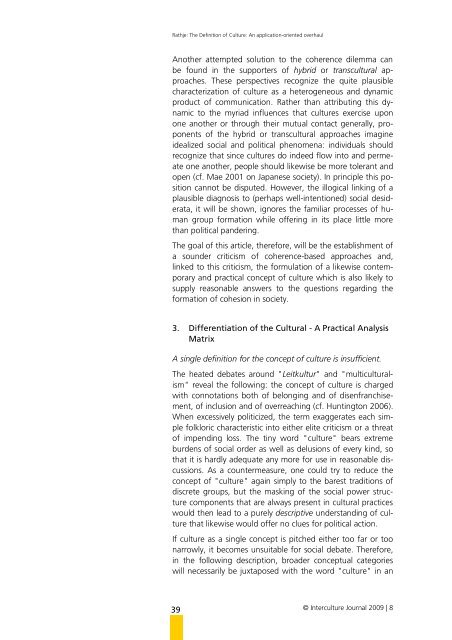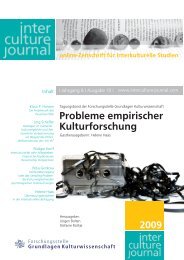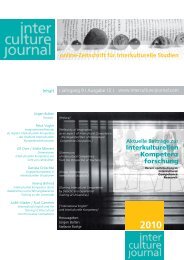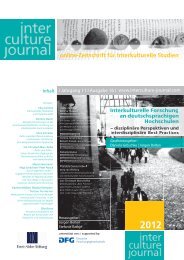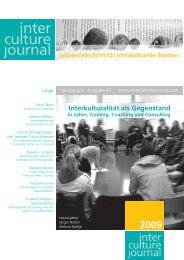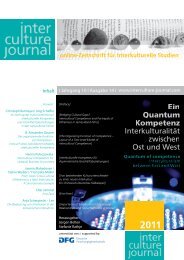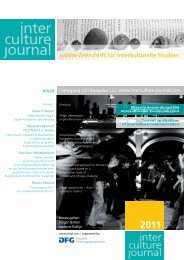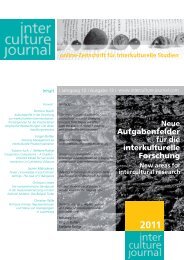Grundlagen Kulturwissenschaft - Interculture Journal
Grundlagen Kulturwissenschaft - Interculture Journal
Grundlagen Kulturwissenschaft - Interculture Journal
Sie wollen auch ein ePaper? Erhöhen Sie die Reichweite Ihrer Titel.
YUMPU macht aus Druck-PDFs automatisch weboptimierte ePaper, die Google liebt.
Rathje: The Definition of Culture: An application-oriented overhaul<br />
Another attempted solution to the coherence dilemma can<br />
be found in the supporters of hybrid or transcultural approaches.<br />
These perspectives recognize the quite plausible<br />
characterization of culture as a heterogeneous and dynamic<br />
product of communication. Rather than attributing this dynamic<br />
to the myriad influences that cultures exercise upon<br />
one another or through their mutual contact generally, proponents<br />
of the hybrid or transcultural approaches imagine<br />
idealized social and political phenomena: individuals should<br />
recognize that since cultures do indeed flow into and permeate<br />
one another, people should likewise be more tolerant and<br />
open (cf. Mae 2001 on Japanese society). In principle this position<br />
cannot be disputed. However, the illogical linking of a<br />
plausible diagnosis to (perhaps well-intentioned) social desiderata,<br />
it will be shown, ignores the familiar processes of human<br />
group formation while offering in its place little more<br />
than political pandering.<br />
The goal of this article, therefore, will be the establishment of<br />
a sounder criticism of coherence-based approaches and,<br />
linked to this criticism, the formulation of a likewise contemporary<br />
and practical concept of culture which is also likely to<br />
supply reasonable answers to the questions regarding the<br />
formation of cohesion in society.<br />
3. Differentiation of the Cultural - A Practical Analysis<br />
Matrix<br />
A single definition for the concept of culture is insufficient.<br />
The heated debates around "Leitkultur" and "multiculturalism"<br />
reveal the following: the concept of culture is charged<br />
with connotations both of belonging and of disenfranchisement,<br />
of inclusion and of overreaching (cf. Huntington 2006).<br />
When excessively politicized, the term exaggerates each simple<br />
folkloric characteristic into either elite criticism or a threat<br />
of impending loss. The tiny word "culture" bears extreme<br />
burdens of social order as well as delusions of every kind, so<br />
that it is hardly adequate any more for use in reasonable discussions.<br />
As a countermeasure, one could try to reduce the<br />
concept of "culture" again simply to the barest traditions of<br />
discrete groups, but the masking of the social power structure<br />
components that are always present in cultural practices<br />
would then lead to a purely descriptive understanding of culture<br />
that likewise would offer no clues for political action.<br />
If culture as a single concept is pitched either too far or too<br />
narrowly, it becomes unsuitable for social debate. Therefore,<br />
in the following description, broader conceptual categories<br />
will necessarily be juxtaposed with the word "culture" in an<br />
39<br />
© <strong>Interculture</strong> <strong>Journal</strong> 2009 | 8


